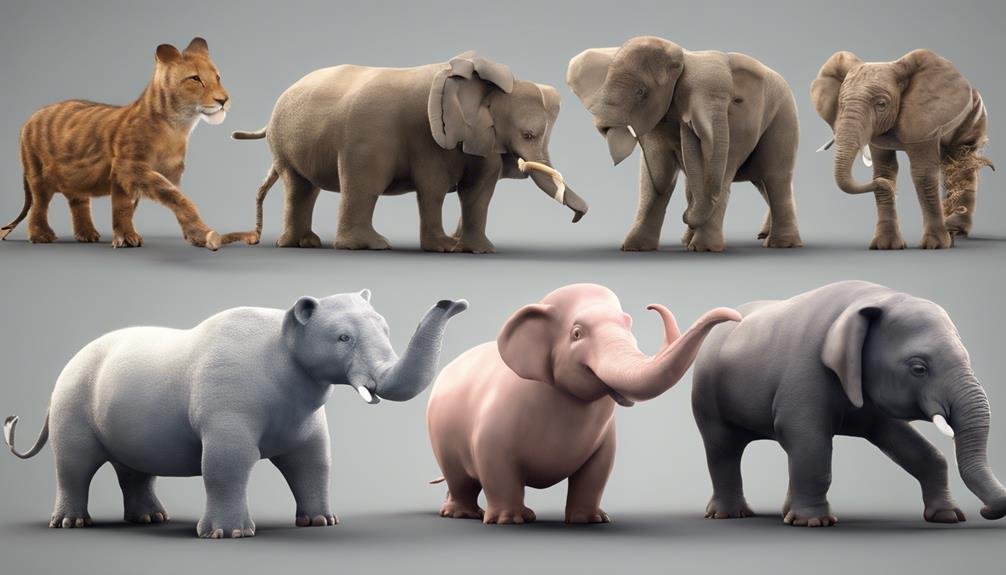The Role of Natural Selection in Personality Development
As you ponder the intricate connection between natural selection and personality development, consider how certain traits have persisted over generations due to their advantageous nature. The subtle dance between genetic predispositions and environmental pressures reveals a fascinating tapestry of human behavior. Why do some personalities thrive while others fade into obscurity? The answer lies in the subtle yet powerful forces of evolution that continue to shape who we are.
Key Takeaways
- Personality traits like extraversion and neuroticism evolved due to selective pressures.
- Genetic variation shapes individual differences and behavioral patterns.
- Certain traits were favored over generations for their adaptive value.
- Natural selection influences the development of personality traits.
- Genetic diversity impacts the interaction and development of traits.
Evolutionary Theory and Personality
In evolutionary psychology, personality traits are viewed as adaptive characteristics that have been shaped by natural selection over time. These traits are believed to have provided our ancestors with advantages in survival and reproduction, leading to their persistence in the gene pool. Natural selection acts on heritable variations within a population, favoring traits that increase an individual's chances of passing on their genes to the next generation.
Therefore, personality traits that enhance an individual's ability to acquire resources, attract mates, navigate social hierarchies, and avoid danger are more likely to be passed down through generations.
Evolutionary psychologists propose that certain personality traits, such as extraversion or neuroticism, may have evolved due to the selective pressures our ancestors faced in their environments. For example, individuals who were more outgoing and sociable may have been better at forming alliances and gaining access to resources, increasing their chances of survival and reproduction.
Conversely, those who were more cautious and anxious may have been more adept at detecting and avoiding potential threats, also increasing their likelihood of reproductive success.
Genetic Variation in Personality Traits
You possess a unique genetic makeup that influences your personality traits, contributing to the overall diversity of personality characteristics within a population.
The inheritance of personality traits through genetic mechanisms highlights the role of genetics in shaping individual differences in behavior and temperament.
Understanding the evolutionary impact on personality can provide insights into how genetic variations have been selected for over generations to enhance survival and reproductive success.
Genetic Personality Diversity
The genetic variation in personality traits plays a vital role in shaping individual differences and influencing the process of natural selection in human populations. Personality evolution is influenced by a combination of genetic diversity and environmental factors, contributing to the diverse behavioral patterns observed within societies.
Genetic diversity within a population leads to variations in personality traits, affecting how individuals respond to external stimuli and interact with their surroundings. These variations are essential for the survival and adaptation of a species over generations.
Understanding genetic personality diversity is pivotal in elucidating the mechanisms by which certain traits are favored or selected against in different environments. In the context of natural selection, individuals with specific personality traits may have a higher likelihood of reproductive success, leading to the transmission of those traits to future generations.
This continuous process of selection based on genetic personality diversity contributes to the complex interplay between genetics, behavior, and environmental pressures in shaping the evolutionary trajectory of a species.
Personality Trait Inheritance
Considering the intricate interplay of genetic variation in personality traits, the inheritance patterns of these traits contribute significantly to the evolutionary dynamics of populations. Nature vs. Nurture plays an important role in unraveling the origins of personality traits. Behavioral Genetics explores how genes and environments interact to shape individual differences. The heritability of personality traits, as demonstrated by twin and adoption studies, highlights the genetic component in personality development.
Evolutionary Theory suggests that certain personality traits may have been favored over generations due to their adaptive value. Traits such as sociability, aggression, and risk-taking behavior might've conferred advantages in survival and reproduction, leading to their prevalence in populations. Genetic variations in personality traits can provide individuals with different strategies for maneuvering social hierarchies, forming alliances, and securing resources.
Understanding the genetic underpinnings of personality traits is essential for comprehending how these traits are passed down through generations and how they contribute to the diversity and adaptability of populations. This knowledge sheds light on the complex interplay between genetics, environment, and evolution in shaping personality.
Evolutionary Impact on Personality
Genetic variation in personality traits plays a pivotal role in the evolutionary impact on individual behaviors and characteristics. Evolutionary psychology explores how these variations contribute to the overall personality evolution within a population.
Through genetic diversity, individuals exhibit a range of personality traits that are subject to natural selection pressures. Traits such as extraversion, conscientiousness, and openness to experience are influenced by genetic factors, shaping an individual's adaptive responses to their environment.
Evolutionary psychologists argue that certain personality traits may have provided an advantage in ancestral environments, leading to their prevalence in modern populations. For example, traits like agreeableness and emotional stability could have enhanced social cohesion and survival rates within early human groups.
Genetic variation not only influences the development of specific personality traits but also impacts how these traits interact and manifest in individuals over time.
Survival Advantage of Personality Traits
You must contemplate the intricate relationship between genetic fitness and personality traits, as they play an essential role in adaptation for survival. Evolutionary processes favor certain personality characteristics that enhance an individual's ability to navigate challenges in their environment.
These advantageous traits contribute greatly to the individual's overall reproductive success and ultimately shape the population's genetic makeup over time.
Genetic Fitness and Traits
Within the domain of evolutionary psychology, personality traits that confer a survival advantage due to their genetic fitness are subject to natural selection. Genetic fitness refers to the ability of an individual's genes to be passed on to subsequent generations.
Certain personality traits can enhance an individual's genetic fitness by increasing their chances of survival and reproduction. For example, behavioral tendencies such as risk-taking, social dominance, and empathy can impact an individual's ability to navigate their environment successfully and attract mates.
Personality evolution is influenced by the interplay between genetic predispositions and environmental factors. Traits that are associated with higher genetic fitness are more likely to be passed on to future generations through the process of natural selection. Over time, individuals with personality traits that offer a survival advantage may become more prevalent in a population.
This continuous cycle of genetic fitness and personality evolution contributes to the diversity of personality traits observed in human populations today.
Adaptation for Survival
Personality traits that provide a survival advantage through enhancing an individual's ability to navigate their environment and attract mates are subject to natural selection in the process of evolution. Natural selection, a fundamental mechanism in evolution, acts on genetic variation within a population, favoring traits that increase an organism's chances of survival and reproduction.
In the context of personality traits, those that confer a survival advantage play an essential role in an individual's ability to adapt to changing environmental pressures. Survival adaptation is a key aspect of natural selection, where individuals with traits that aid in survival are more likely to pass on their genes to future generations.
For instance, personality traits like risk-taking behavior or social dominance can enhance an individual's ability to acquire necessary resources, secure a mate, and protect offspring, ultimately increasing their reproductive success. Through this lens, personality traits aren't just individual quirks but adaptive mechanisms honed by natural selection to promote the survival and proliferation of specific genetic traits within a population.
Adaptation and Personality Development
Adaptation plays a pivotal role in shaping the development of individual personalities. Personality evolution is closely linked to natural selection, where behavioral adaptations are favored based on their ability to enhance survival and reproduction.
Environmental influences act as the driving force behind the selection of certain personality traits over others. Traits that increase an individual's chances of thriving in a particular environment are more likely to be passed down through generations, leading to the gradual evolution of personality characteristics.
Through natural selection, individuals with traits such as risk aversion in dangerous environments or sociability in collaborative settings are more likely to survive and reproduce, passing on these advantageous traits to their offspring. Over time, these behavioral adaptations become ingrained in the population, contributing to the diversity of personalities observed in different species.
As a result, adaptation not only influences physical traits but also plays a significant role in shaping the complex tapestry of personalities seen in the natural world.
Sexual Selection and Personality
The interplay between sexual selection and personality traits is an essential aspect of evolutionary psychology, shedding light on how certain characteristics are favored in mate selection processes. Mate choice plays a vital role in determining reproductive success, with individuals often selecting partners based on specific personality traits.
Personality development is influenced by the preferences individuals have when choosing a mate. Traits such as confidence, kindness, and intelligence are often seen as desirable qualities in a potential partner, leading individuals to develop these traits to increase their chances of reproductive success.
Additionally, certain personality traits may signal genetic fitness, making individuals more attractive to potential mates. Evolutionary psychologists suggest that personality traits linked to resourcefulness, emotional stability, and sociability may enhance an individual's ability to attract a mate and successfully reproduce.
Understanding the role of sexual selection in shaping personality development provides valuable insights into the evolutionary significance of certain traits and behaviors in the context of mate choice and reproductive success.
Environmental Pressures on Personality
In the context of evolutionary psychology, the development of personality traits is particularly influenced by environmental pressures. Environmental influences play a vital role in shaping an individual's personality throughout their life. These pressures can come from various sources such as family dynamics, cultural norms, socioeconomic status, and life experiences.
Social interactions also contribute greatly to personality development, as individuals learn and adapt their behaviors through social relationships and experiences.
Humans, as social beings, are deeply impacted by the interactions they've with others. These social interactions not only shape how individuals perceive themselves but also influence their understanding of the world around them.
For example, positive social interactions can lead to the development of traits such as empathy, cooperation, and communication skills. Conversely, negative social experiences can result in the manifestation of traits like aggression, mistrust, or social withdrawal.
Inheritance of Personality Traits
Genetic inheritance plays a significant role in determining an individual's personality traits, shaping their behavioral tendencies and predispositions. The age-old debate of nature versus nurture comes into play here, highlighting the interplay between genetic predispositions and environmental influences in the development of personality.
While family dynamics and environmental pressures certainly mold a person's character, it's essential to acknowledge the foundational role of genetic factors.
Research has shown that certain personality traits are heritable, indicating a strong genetic component in personality development. Traits like openness, extraversion, conscientiousness, and neuroticism have been linked to specific genetic markers, underscoring the influence of inheritance on individual differences in behavior.
Family studies further support the idea of genetic predispositions, as similarities in personality traits are often observed among biological relatives despite variations in upbringing. Understanding the inheritance of personality traits provides valuable insights into the complexity of human behavior.
Behavioral Genetics and Personality
Behavioral genetics shapes the intricate interplay between genetic markers and personality traits, elucidating the evolutionary underpinnings of individual behaviors. Genetic predispositions play a vital role in determining behavior patterns, influencing how individuals respond to environmental influences. Studies in behavioral genetics have shown that certain personality traits, such as extraversion or neuroticism, have a heritable component, indicating a genetic basis for these characteristics.
By exploring the genetic underpinnings of personality, researchers can better understand how individuals vary in their responses to environmental stimuli.
Environmental influences also play a significant role in shaping personality traits. While genetics provide a foundation for behavior patterns, environmental factors such as upbringing, social interactions, and life experiences can further mold an individual's personality. The interaction between genetic predispositions and environmental influences is a dynamic process that contributes to the diverse range of personalities observed in human populations.
Understanding the interplay between genetics and environment is essential for comprehending the complexities of personality development.
Evolutionary Psychology Perspectives
Evolutionary psychology offers a unique lens through which to examine the pivotal significance of personality traits in human development. By studying how behaviors have evolved over generations, researchers can uncover insights into the behavioral adaptations that have been favored by natural selection. These behavioral adaptations are vital for survival and reproduction, shaping the way individuals interact with their environment and others.
When considering evolutionary psychology perspectives on personality development, it becomes evident that certain traits may have conferred advantages to our ancestors, leading to their persistence in modern human populations. For example, traits like altruism, aggression, and risk-taking behavior can be understood through the lens of natural selection implications.
Altruism, for instance, may have been favored due to its benefits for group cooperation and survival, while aggression could have provided advantages in securing resources or defending against threats. Understanding these evolutionary roots of personality traits can provide valuable insights into the complex interplay between genetics, environment, and behavior in shaping human psychology.
Conclusion
You may think your personality is uniquely yours, shaped by your experiences and choices. But in reality, it's the result of millions of years of natural selection, fine-tuning traits for survival and reproduction.
So next time you find yourself feeling anxious or aggressive, remember that these traits have been carefully selected for by evolution to give you an edge in the game of life.
Embrace your inner survivor.







